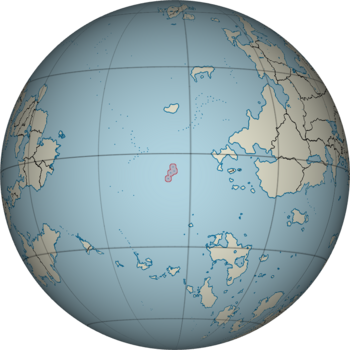Tabulu
This article is incomplete because it is pending further input from participants, or it is a work-in-progress by one author. Please comment on this article's talk page to share your input, comments and questions. Note: To contribute to this article, you may need to seek help from the author(s) of this page. |
Commonwealth Republic of the Tabulu Islands Ca'bua Ton Fa'tim Tabulu | |
|---|---|
Anthem: O, Heavenly Tabulu | |
 | |
| Capital and | Fort Ka'kua 03°15'S 157°12'W |
| Official languages | Tabuluan, Torvonese |
| Recognised national languages | Common |
| Ethnic groups (2018) | |
| Religion (2018) |
|
| Demonym(s) | Tabuluan |
| Government | Federal Constitutional Presidential Republic |
• President | Ocan T'fika |
• Vice President | Hic'Moa Tavaka |
| Legislature | National Assembly |
| Representative Assembly | |
| Senatorial Assembly | |
| Independence From Torvon | |
• Torvonese Exploration | 1689 |
• Introduction as Crown Colony | October 19, 1842 |
• Partial Independence Granted | June 6, 1906 |
• Independence Granted | January 12, 1979 |
| Area | |
• | 812.3 km2 (313.6 sq mi) |
• Water (%) | 0.4 |
| Population | |
• 2021 estimate | 198,500 |
• 2018 census | 195,312 |
• Density | 240/km2 (621.6/sq mi) |
| GDP (PPP) | 2018 estimate |
• Total | $416 Million |
• Per capita | $34,312 |
| GDP (nominal) | 2018 estimate |
• Total | $318 Million |
• Per capita | $29,899 |
| Gini (2018) | low |
| HDI (2021) | medium |
| Currency | Tabuluan Dollar (TDR) |
| Time zone | UTC-10 UCT (Central Paisi Time) |
| Date format | dd/mm/yyyy AD |
| Driving side | right |
| Calling code | +828 |
| Internet TLD | .tbu |
The Commonwealth Republic of the Tabulu Islands, more commonly known as Tabulu or the Tabulu Islands, is a small island nation located in Kristalotodove. Tabulu has a population of 195,312 citizens as of 2018, of which roughly 42,000 live in the national capital of Fort Ka'kua. Tabulu is a federal constitutional presidential republic. The 112 islands that Tabulu controls are divided into 14 provinces, with any city containing a population higher than 20,000 declared a federal territory. In recent years, Tabulu has become a very popular tourist destination, of which Tabulu has used to raise awareness about the climate crisis that would raise the sea level, eventually drowning Tabulu. Education and employment are recognized largely as high priorities of the government, with a literacy rate of 99.8 percent and an employment rate of 3.8 percent. Many workers are employed in the countries' wind energy programmes, as well as working in the tourism industry. Tabulu's foreign relations with most countries are warm, however nations that produce large amounts of non-renewable resources have been often criticized by Tabulu.

